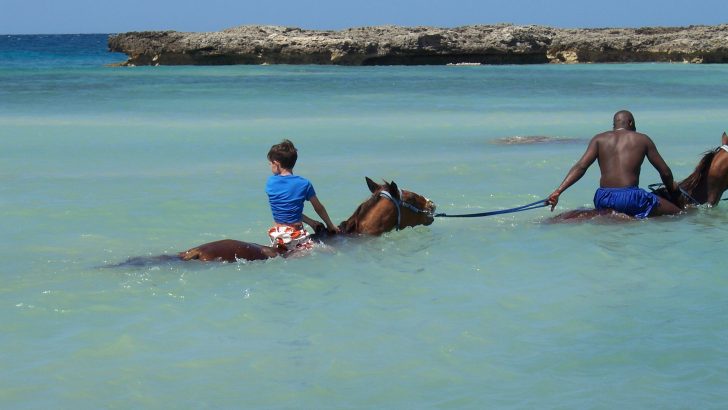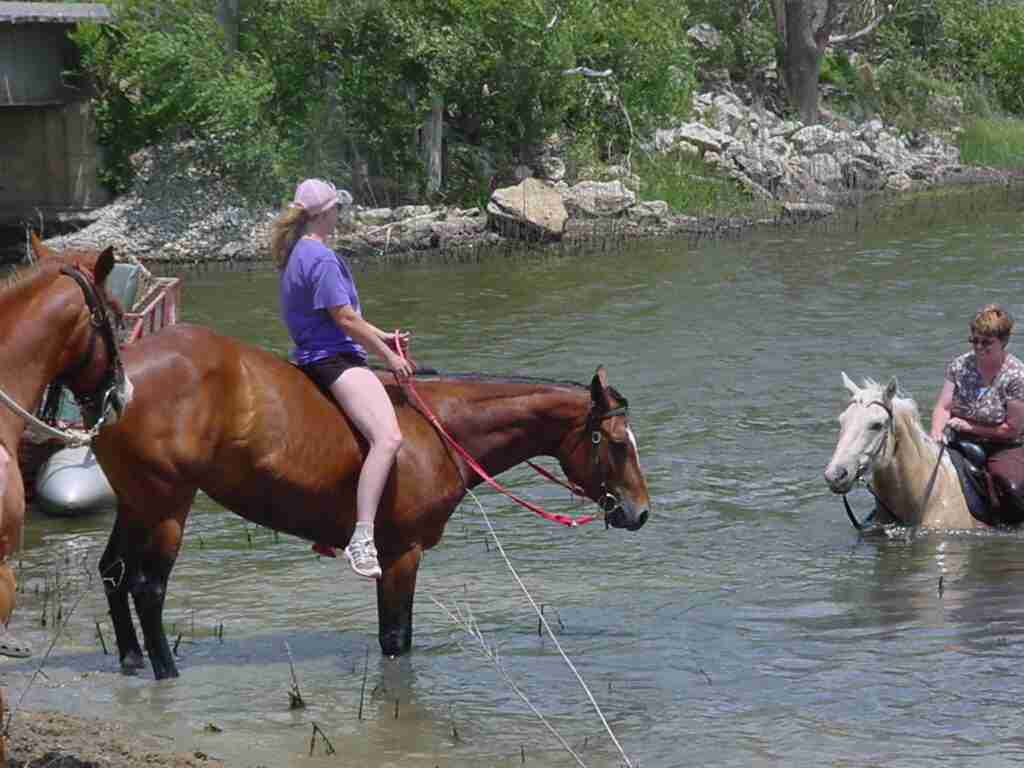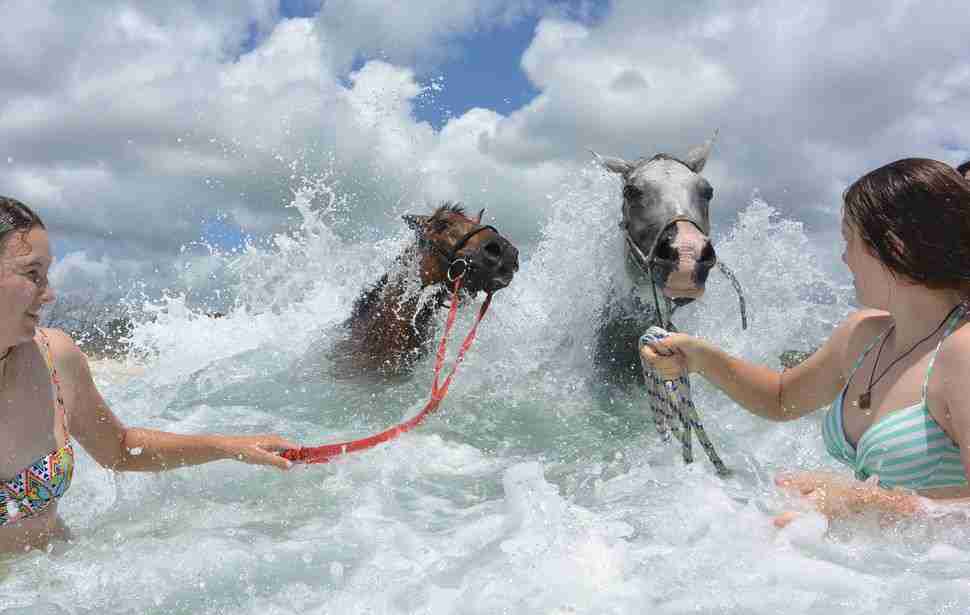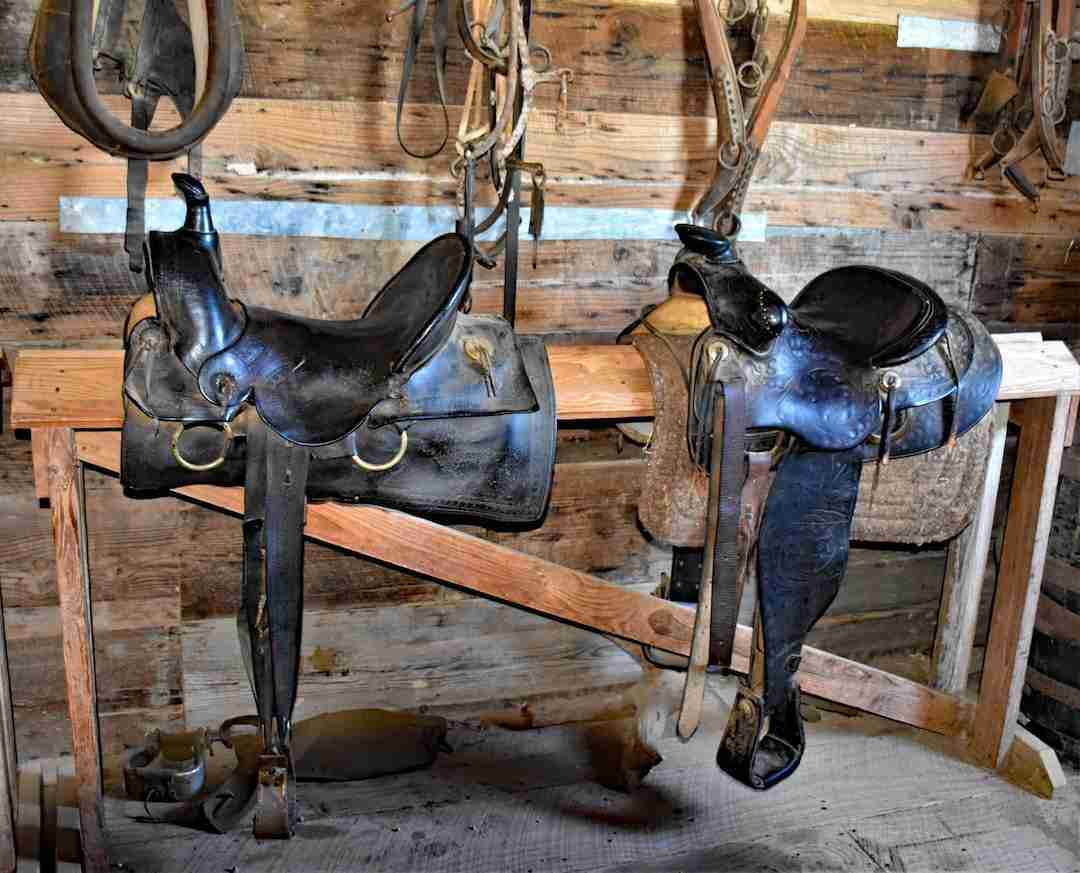It’s common to see horses walking and even running through shallow water, but how do horses fare in deeper water? Can horses swim, sink, or float? The answer may surprise you!
Horses are excellent swimmers, thanks to their long, powerful legs that propel them through the water and their body’s natural buoyancy. Horses’ large lungs, which hold about 14.5 gallons of air each, help to keep them afloat. They instinctively know to keep their head above the water’s surface.
Horses have had to evolve the ability to swim, but most horses today swim for recreation and exercise, not for survival. What you should know about swimming horses – why it comes naturally to them, why it is beneficial for them, and whether they actually enjoy it.
Can Horses Swim, Or Do They Sink?
Although horses are big, heavy creatures, they do not sink like a rock in water. Horses’ bodies are rather buoyant, and they can swim. Even the largest horse breeds, like Percherons, Clydesdales, and Draft horses, can swim!
You do not have to teach a horse the basics of swimming. They intuitively know to make a paddling motion with their legs to tread water and propel themselves forward.
Horses cannot hold their breath underwater the way we can, but they instinctively know to hold their head above the water so that they can breathe.
Can All Horses Swim?
Most horses that have been introduced to large bodies of water from a young age can swim well. Whether they do so willingly or not is a different story!
Just like humans, horses have different natural abilities. Swimming comes easily to some horses, while others may find it more difficult.
But the bottom line is that all horses can swim. Horses have had to evolve the ability to swim for survival.
Why Are Horses Naturally Good At Swimming?
Horses have two key physical characteristics that make them natural-born swimmers:
- Horses have very large lungs that make their bodies buoyant, helping them float in water. Each lung has a capacity of 14.5 gallons! When their lungs are filled with air, it generates enough buoyant force to keep them afloat.
- Horses have long, powerful legs for running. The same muscles give them the strength to paddle and kick, propelling their bodies forward through the water.

How Did Horses Evolve The Ability To Swim?
Domestic horses’ cousins in the wild swim all the time. Zebras on the Serengeti and Maasai Mara need to swim to cross deep, dangerous, crocodile-infested waters on their migration journeys.
But how did horses develop this natural ability to swim? What caused them to evolve this skill?
Horses developed the ability to swim to help them escape from predators and to reach better grazing in times of food scarcity.
Around 10 000 years ago, climate change caused the vegetation type in North America to change, and there was less and less grazing available. The horses living there started to go extinct.
Horses that could swim migrated to Europe by swimming across the Bering Strait. The horses that did not have the ability to swim went extinct.
Is Swimming Good For Horses?
Today, most domestic horses no longer need to swim to survive. Horses now mainly swim because they enjoy it or for exercise.
Swimming is excellent for improving horses’ stamina, flexibility, and range of motion. It also helps to increase muscle development.
Hydrotherapy has become a popular way to rehabilitate and condition performance horses. Unlike trotting or galloping on land, when horses swim, there is far less impact on their joints.
Horses with muscle or joint injuries and horses that have undergone surgery benefit from hydrotherapy because swimming works their muscles in a different way than walking or running.
Even horses without injuries benefit from swimming and hydrotherapy. Professional equestrian trainers include up to three weekly swimming sessions for their horses.
Do Horses Enjoy Swimming?
It is fun for us to go swimming with our horses, but do they also enjoy it?
Many horses love to swim. If they have access to a lake, pond, or slow-flowing river, they may even take themselves swimming on hot days to cool down.
However, not all horses enjoy swimming. If a horse has not been properly introduced to deep bodies of water, swimming can be very intimidating for them.
Horses do not have the same depth perception as we do. We can look into a body of water and judge how deep it is, whereas horses cannot. Therefore, you must slowly introduce horses to swimming.
If a horse has had bad experiences in water, it will be more averse to swimming. Some horses just don’t like the feeling of getting wet.

Can Horses Swim In The Ocean?
Horses can swim in the ocean. Swimming with your horse at the beach is possibly one of the most rewarding experiences an equestrian can have.
Because salt water is slightly denser than seawater, horses are more buoyant in the ocean. Therefore, it is a bit easier for horses to swim in the sea.
But swimming in the sea is very different from swimming in a calm body of fresh water. It is far riskier for horses to swim in the ocean because of currents and waves.
Horses cannot hold their breath and duck-dive under big waves the way humans can. Therefore, one should never take a horse swimming when the swell is high and the waves are rough.
The best beaches to take horses for a swim are in large, sheltered bays where the waves are small and gentle.
How Fast Can A Horse Swim?
Horses are nowhere near as fast in the water as they are on land. Water offers a lot more resistance than air, and this is what slows them down.
All horses have different abilities, and some horses can swim faster than others. However, in general, the maximum speed that a horse can swim at is about 2.5 miles per hour.
Other Articles You Maybe Interested In
- The Signs That Your Horse Trusts You
- 10 Signs That A Horse Likes You
- Can Horses Eat Corn On The Cob?
- How Does A Horse Crow Hop?
- Styles of Horse Reins and How To Use Them
How Long Can A Horse Swim For?
Swimming requires far more physical exertion for a horse than running. They do not spend much energy keeping their bodies afloat, thanks to their natural buoyancy. Most of the energy they exert while swimming is to move their body forward through the water.
Therefore, horses cannot swim as far as they can run. For a horse, a short, ten-minute swim can burn the same amount of energy as running for several miles.
There are several things influencing how long a horse can swim:
- The horse’s fitness. The stronger and fitter a horse is, the further it can swim.
- The horse’s breed. Some breeds, like Mustangs and Arabians, naturally have more strength and endurance than others and can, therefore, swim further.
- How much swimming experience the horse has. Horses that are used to swimming can swim for much longer than horses that are new to the activity.
- The water depth. Horses can swim further in shallower water than in deeper water.
- How calm the water is. Horses can swim further in flat, calm conditions than in wavy water.
- Whether there are strong currents. Horses can swim further in lakes and ponds where there are no currents.
In general, horses can swim for about 30 minutes before they need a rest. If a horse is fitter, it can swim for longer than this.
Professional horse trainers that exercise their horses in pools have training sessions that are about 30 minutes long typically.
In terms of distance, horses can generally swim for about half a mile.

Can You Ride A Swimming Horse?
Horses are strong enough to carry you on their back while they swim! The feeling of riding a horse while it is swimming is absolutely thrilling because you can really feel its power.
However, you must be very careful riding a horse in deep water. It is critical not to obstruct their natural movement in the water because it can cause them to panic.
When riding on top of a horse while it is swimming, you must keep the reins loose. The horse needs to be able to keep its head up so that it can breathe.
It is better to remove a horse’s saddle when you swim with them. The saddle restricts their natural movement and can hinder their ability to swim.
You do not have to guide or control the horse while it is swimming with you on its back. All you need to do is let them move as naturally as possible.
What Are The Dangers Of A Horse Swimming?
Just like there are risks and dangers for us when we swim, it can be risky and dangerous for horses to swim. Horses, like humans, can drown!
Horses do not have the ability to hold their breath underwater. Therefore, if their mouth and nose dip below the water’s surface, water can get into their lungs, and they can drown.
It is critical to keep a horse’s entire head above the water’s surface when you take them swimming.
Swimming is particularly dangerous for horses that suffer from respiratory issues. Being underwater increases the hydrostatic pressure on a horse’s lungs. This decreases the volume of their lungs.
For a horse with lungs that are already compromised by a respiratory disease, this could severely hamper their ability to breathe while they swim.
Introduce Horses To Swimming Very Gradually!
It is best to get horses used to water when they are still young. Young horses will quickly get the hang of swimming.
Even older horses that have never swum before can be introduced to water and taught to swim. However, it is crucial to do so very gradually.
If you rush a horse into swimming before they are ready, it can panic and get into a dangerous situation.
To begin teaching a horse basic water safety, you should start by cueing them to walk into shallow water. The horse must wear a bridle and lead rope so that you can cue them to move their shoulders and hips away from you.
Before the horse gets nervous, lead them out of the water. Repeat this until the horse is comfortable getting its legs wet.
When the horse is happy walking in water up to their knees, you can begin getting them used to their body being wet. Gently wet their chest, legs, and belly.
Once a horse feels the cool water on its skin, it will quickly realize how nice it feels. They will become eager to explore deeper waters.
To train a horse to swim, you should lunge them in a circle near a body of water. Part of the circle will be in the water.
Gradually lunge them further and further away from you so they go deeper into the water. Eventually, they will realize they need to swim, and their instincts will kick in.

Conclusion
Horses will not sink in water. They have evolved to be strong swimmers. Horses’ bodies are naturally buoyant, and their long, powerful legs help to propel them forward through the water. Some horses enjoy swimming, while others are more averse to water.
It is healthy and beneficial for horses to regularly spend time swimming. It strengthens their muscles and increases their flexibility and range of mobility. This is why hydrotherapy has become so popular for performance horses.
Resources









